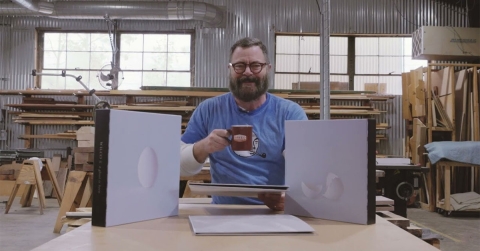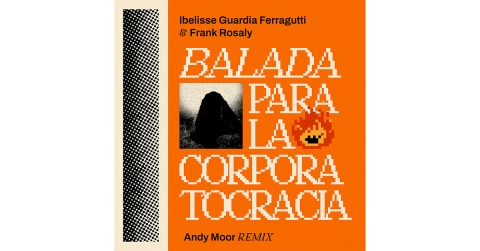The award-winning French singer and composer Camille's fifth studio album, OUÏ, is out now in the US on Nonesuch. Recorded over a year in La Chartreuse, a 14th-century monastery-turned-artist's residence in Avignon, OUÏ features folk music, hymns, ballads, pop, lullabies, and a cappella, with Camille on all vocal parts and all but one song in French. "A Parisian pop genius," says Pitchfork. "OUÏ is rich with brilliant, funny ideas about conception, nature, and identity, with plenty of pure pleasure hits for non-Francophones." Camille performs an intimate album-release show at (Le) Poisson Rouge in NYC on Monday, October 16.
The award-winning French singer and composer Camille's fifth studio album, OUÏ, is out now in the United States on Nonesuch Records. To pick up a copy, head to your local record store, iTunes, Amazon, and the Nonesuch Store, and listen now on Spotify and Apple Music.
Recorded over the course of a year in La Chartreuse—a fourteenth-century monastery-turned-artist’s residence in Avignon, France—OUÏ was released internationally earlier this year on Because Music to critical and popular acclaim. Debuting at #1 in the French charts, the album was called "a celebration of a vocal instrument as dexterous as it is delicate, with sounds given new shapes and word play at a premium" by the UK’s Evening Standard. "A Parisian pop genius," says Pitchfork. "OUÏ is rich with brilliant, funny ideas about conception, nature, and identity, with plenty of pure pleasure hits for non-Francophones." OUÏ was co-produced by Camille with two of her longtime collaborators: composer and multi-instrumentalist Clement Ducol and sound and mixing engineer Maxime Leguil. Mostly sung in French, the album also includes one song in English, "Seeds."
In celebration of the album’s release, Camille performs an intimate show at New York City’s (Le) Poisson Rouge this Monday, October 16; tickets are on sale here.
OUÏ features the versatile Moog analogue synthesizer, and percussion is used throughout the album as a sort of bedrock. As Camille says, "The story of the album is like this, moving from the arcane drums to the treble and harmonics and light in my voice. All the voices are telling a story, and I am all the voices."
"It really resonates," says Camille, "On some songs there are no drums, just this sub-bass like a kick drum, which leads the way and gives it a beat."
Though Camille initially set out to write politically charged songs inspired by drum-driven French traditional dances, after reflecting upon her country’s recent tragic events, she was drawn to create something more peaceful—a vowel-oriented and resonant exploration of sound. The album’s title—ooo…eee—came from that playfulness with sounds and language, a breaking free of restrictions.
Becoming a mother for the second time also was an influence: "Having my children made me want to dive again into the spring of life, of love, of sound. All this mothering has led me to an approach of fluidity, I am enthusiastic about the cultural renaissance that is coming up, this going back to earth."
OUÏ also pays tribute to Camille’s father: "My father was a singer and while he didn’t do music for a living he definitely showed me the way. This is the first time he won’t hear a new album of mine, which is maybe why I called it OUÏ—like ‘heard’[the French word for "hearing is "l’ouïe"]. I wanted to make something so resonant, so beautiful, that he can hear it where he is. Music has always helped me communicate on another very subtle level."
Camille is known internationally for her live performances, which run the gamut from cross-art-form happenings in Paris, London, and Sydney to a pared down tour of chapels in the Le Beaujolais region of France. Camille’s previous Nonesuch recording was with David Byrne and Fatboy Slim on their album Here Lies Love, singing “Pretty Face.”
- Log in to post comments



